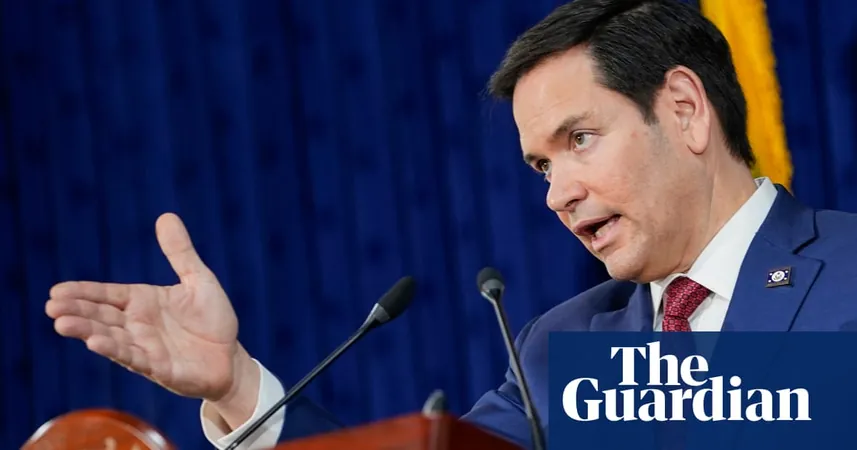
Marco Rubio's Controversial Visa Crackdown: Over 300 Revoked Amid Pro-Palestine Protests!
2025-03-28
Author: Olivia
Introduction
In a shocking move that has sparked outrage across the nation, U.S. Secretary of State Marco Rubio has revealed that over 300 visas have been canceled as part of a sweeping review targeting individuals involved in pro-Palestine activism. This strategy, characterized by Rubio's unflinching rhetoric, has alarmed many who see it as an attack on free speech and civil liberties.
Details of the Announcement
Rubio's announcement came during a press conference in Guyana, where he confirmed the cancellation of more than 300 visas, calling those affected ‘lunatics’ associated with recent campus protests. He stated, ‘Maybe more than 300 at this point. We do it every day, every time I find one of these lunatics.’ This aggressive approach has raised questions about the exact criteria being used to identify individuals for visa revocation.
Case Study: Rumeysa Ozturk
One case that has drawn significant attention is that of Rumeysa Ozturk, a Turkish doctoral student on a Fulbright scholarship at Tufts University. Ozturk was detained by masked agents after she co-authored an op-ed supporting Palestinian rights in her student newspaper. The Department of Homeland Security (DHS) claimed she had ‘engaged in activities in support of Hamas,’ a justification that critics argue undermines academic freedom and free expression.
Rubio's Stance
In response to Ozturk's situation, Rubio firmly stated, 'We revoked her visa... once you’ve lost your visa, you’re no longer legally in the United States. If you come into the US as a visitor and create a ruckus for us, we don’t want it. Go back and do it in your country.' This assertion has intensified concerns regarding the chilling effect such policies may have on open discourse and dissent among students and activists.
Broader Implications
However, the visa revocation campaign is just a slice of a broader enforcement agenda. The Trump administration has implemented additional restrictive measures, including halting green card processing for specific refugees and asylum seekers while issuing directives to deny entry to transgender athletes, further limiting individuals seeking refuge or opportunity in the U.S.
Official Statements and National Security Concerns
The State Department recently declared that it had revoked the visas of more than 20 individuals, with hundreds more under review based on ‘national security concerns.' Their statement emphasized a commitment to processing visa reviews to ensure compliance with U.S. laws and the safety of American citizens.
Conclusion
Critically, the exact nature of these revocations—whether they pertain to student visas, work visas, or other categories—remains unclear, leaving many to wonder how extensive and discriminatory this crackdown will become. As the situation unfolds, it’s evident that the intersection of national security and civil liberties will continue to provoke intense debate across the nation. Will activism face further repercussions in the name of security, or will calls for accountability and free speech prevail? The answer may redefine the landscape of protest and expression in America.









 Brasil (PT)
Brasil (PT)
 Canada (EN)
Canada (EN)
 Chile (ES)
Chile (ES)
 Česko (CS)
Česko (CS)
 대한민국 (KO)
대한민국 (KO)
 España (ES)
España (ES)
 France (FR)
France (FR)
 Hong Kong (EN)
Hong Kong (EN)
 Italia (IT)
Italia (IT)
 日本 (JA)
日本 (JA)
 Magyarország (HU)
Magyarország (HU)
 Norge (NO)
Norge (NO)
 Polska (PL)
Polska (PL)
 Schweiz (DE)
Schweiz (DE)
 Singapore (EN)
Singapore (EN)
 Sverige (SV)
Sverige (SV)
 Suomi (FI)
Suomi (FI)
 Türkiye (TR)
Türkiye (TR)
 الإمارات العربية المتحدة (AR)
الإمارات العربية المتحدة (AR)